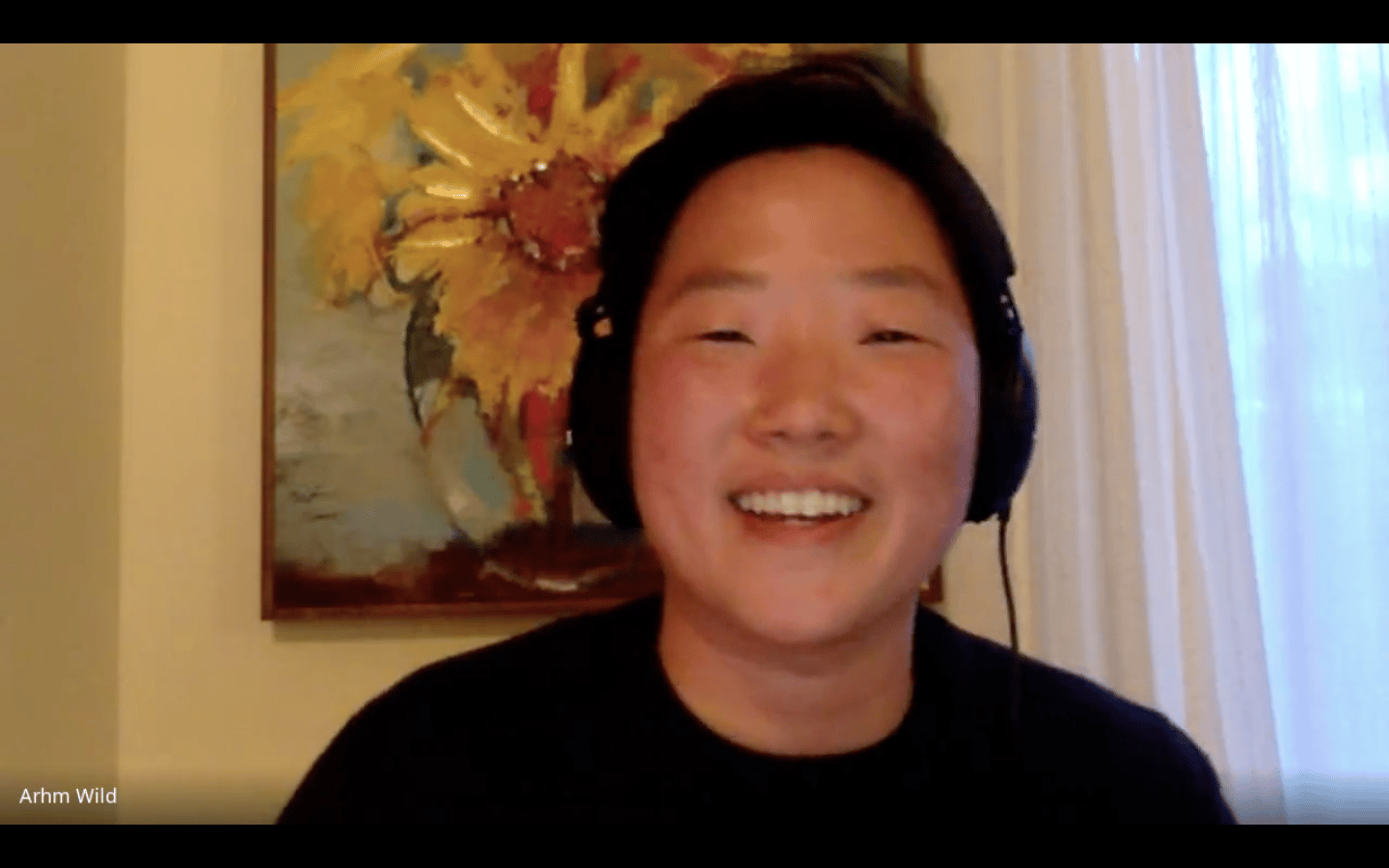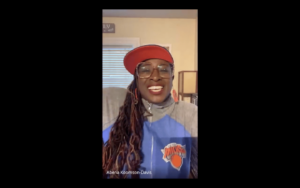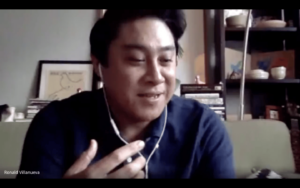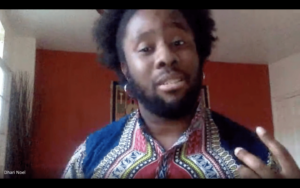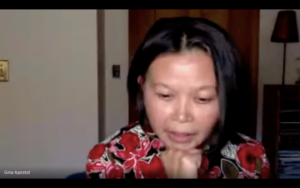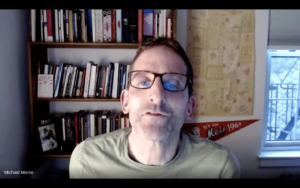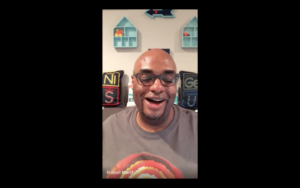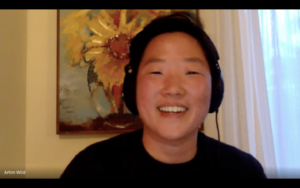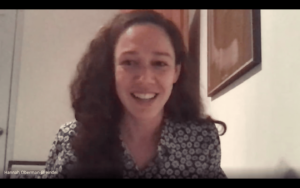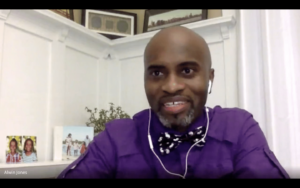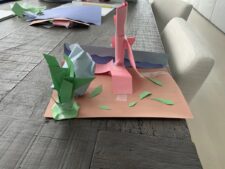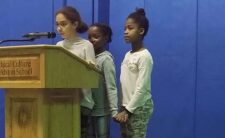The viewers filtered in in a steady stream, then in a torrent: 20-odd participants in a Google Meet jumped to 50, then 70, 80. By the time Arhm Choi Wild — Fieldston Middle and Fieldston Upper Diversity, Equity, and Inclusion Coordinator — hopped on-screen to introduce the first-ever ECFS Faculty Spotlight on May 7, almost all of the 112 viewers who would partake in the night had signed on. The chat window fluttered with words of encouragement.
For 90 minutes, the nine performers — all faculty and staff members at the Ethical Culture Fieldston School — took their turns stepping into the limelight as a rapt audience watched.
The genesis of the Faculty Spotlight can be traced to a series of conversations Wild had with their colleagues earlier in the school year.
“I was chatting with different folks at School and was just amazed by how many accomplished people we have on staff,” they say. “I feel like ECFS is a really special place where I can grow as an artist and educator, as well as an equity practitioner, and a lot of that is because of the amazing folks we have on staff.”
Originally, the event, which aimed to recognize and celebrate the array of talents that exists in the ECFS community, was scheduled to take place on campus. The onset of the COVID-19 crisis prevented an in-person show, but it did little to derail Wild’s hopes of organizing a performance — if anything, it galvanized them. “Despite all of our different lived experiences, art can be such a powerful force that can reveal or solidify the connections that we have with each other,” they explain. “When educators become more whole people or more well-rounded people, it increases the potential for connection with students.” Instead of taking place on ECFS’s campus, the faculty spotlight would be held online, each performer recording live from their own home.
There’s a long tradition in the creative community of writers and musicians and comedians standing in the intimate space of a bookstore or a bar to perform their work for a small audience. Rarely, though, does that intimacy seem as evident as it did during this spotlight, when each of the performers invited over 100 guests into their home. From the vantage point of their own residences, students and families glimpsed artifacts from the lives of beloved teachers: a Spiderman figurine, a Mets banner, pillows embroidered with elements from the periodic table.
Even for seasoned performers like the ECFS faculty, the experience was a bit jarring. “Having everyone’s mics off and not having the normal type of response from the audience is really disorienting,” Dhari Noel ’15 — Fieldston Middle and Fieldston Upper Ethics and Theatre and Dance Teacher, who performed excerpts from his play, “Man Made” — explains. But almost two months of remote teaching had prepared him to shine on camera.
In some ways, the ability to perform from home conferred an additional layer of immediacy to Noel’s work. “Man Made” — which examines the legacy of Seneca Village, the primarily African-American settlement that was razed for the construction of Central Park — speaks deeply to his experiences as an activist, educator, and alum of ECFS, where lower school students spend an entire year unpacking the historical event.
“I think that — especially with the work I’m presenting, since it’s so personal and I’m so passionate about it — it feels kind of natural for it to be in my home and for people to see my home while I’m performing,” he says. “It requires us to be vulnerable in a really radical way.”
With Clare Mottola, Fieldston Upper Theatre and Dance Teacher, acting as tech moderator and Master of Ceremonies, the Faculty Spotlight commenced. Abena Koomson-Davis, Fieldston Middle and Fieldston Upper Ethics Teacher, opened the evening with a rap, singing bars and spitting rhymes with equal aplomb. Russell Marsh, Fieldston Upper Diversity, Equity, and Inclusion Coordinator, crooned a soulful, shiver-inducing rendition of Stevie Wonder’s “Love’s in Need of Love Today.” Ron Villanueva, Fieldston Middle English Teacher, and Hannah Oberman-Breindel ’02, Fieldston Upper English Teacher, read poems about love that evoked images both comforting and captivating.
The diversity of artistic mediums — poetry, prose, music, drama — was mirrored in the diversity of the performers’ roles within the School: as English Teachers or Ethics Teachers or Diversity Coordinators. As with any event in which many of the performers identify as queer or women or people of color, it was heartening to see historically marginalized voices take center stage.
Many of the faculty and staff, including Koomson-Davis, Oberman-Breindel, Noel, and Villanueva, debuted new or still-developing work. Wild read excerpts — poignant explorations of Asian-American identity — from their just-released collection of poetry, Cut to Bloom. Michael Morse, Fieldston Upper English Teacher, read “Letter as Mix Tape In Medias Res,” a poem he wrote over spring break as social distancing measures in New York were announced and he found himself pondering the physical and chronological distance of a college girlfriend. Gina Apostol, also a Fieldston Upper English Teacher, read “Tangerine,” a chapter about family, migration, and trauma from a working draft of her upcoming fifth novel.
“People are doing this because they do care for the students and the community,” says Apostol. “I’m hoping that people recognize that, however small these events may be, they are done from a very deep sense that we’re all in this together.”
I feel like ECFS is a really special place where I can grow as an artist and educator, as well as an equity practitioner, and a lot of that is because of the amazing folks we have on staff.
One of the most touching aspects of the viewing experience was to witness the faculty introduce each other. Each time a performer read the prepared biography of the performer going after them, they went off script, sprinkling in personal anecdotes among the accolades and waxing effusive with praise.
It served as a reminder of the faculty’s love of being in community with students and with one another. “Whether you go to a reading in a bookstore, or whether you’re teaching in a classroom, you want to be in a space with people,” Morse explains. “We’ve all been finding out that that’s a huge part of why we do what we do and why we love what we do.”
When Alwin Jones, Fieldston Upper English Teacher, took to the virtual stage to close out the night of performances, he chose to read a poem co-written by his Form IV class.
“What Floats to the Top of Your Smile,” which Jones stitched together from lines penned by his students, is an homage to ECFS. Its imagery — from the “library, giant windows, sun streaming through,” to the “quad on a hot day in May … trees, leaves, new, not-yet-seasoned green / grass just cut, anticipating graduating feet” — is familiar to any student or alum. The poem runs through the hallways of the Fieldston campus — greeting the many teachers the narrator encounters along the way — and ends in a haiku: “we thank you teachers / for all you do to bring out / the best in us all.”
Wild hopes this will be the first of many Faculty Spotlights that will highlight different voices from the community. Though its physical campuses remain closed, ECFS continues to harbor great artistry and talent, and the event is a powerful showcase of the people who are the pillars of the School.
As viewers at home, we are buoyed by their art — and by the togetherness it creates.
